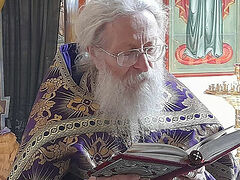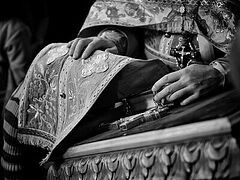St. Justin of Ufa and Menzelinsk was ordained to the priesthood in September 1853. His wife died in 1862, and he was tonsured into monasticism in June 1863. He served at various monasteries and seminaries, and on January 27, 1885, he was consecrated Bishop of Mikhailovsk, vicar of the Ryazan Diocese. He served in a number of dioceses, and on October 14, 1896, he was appointed Bishop of Ufa and Menzelinsk. He retired in 1900 and spent the rest of his life until his peaceful repose on September 26, 1903, in monastic reclusion. In 1988, he was glorified as a locally venerated saint in the Synaxis of Crimean Saints.
From that time Jesus began to preach, and to say, Repent: for the Kingdom of Heaven is at hand (Mt. 4:17); the time is fulfilled, and the Kingdom of God is at hand: repent ye, and believe the Gospel (Mk. 1:15). With these words, the Lord began His preaching to mankind. In them is found a binding commandment to all Christians: Repent and believe in the Gospel teaching. Begin with this and continue the work of your salvation for the rest of your life. A true Christian must also be at peace with God. But it’s impossible to be at peace with God without continuous repentance. This repentance is not in words only: “Forgive me, Lord; have mercy on me, Lord!” But at the same time, all actions that condition the absolution of sins must be embraced: a certain consciousness of the impurity of a thought, a look, a word, a temptation, or something else—the consciousness of one’s guilt and lack of defense—without self-justification, and a pray for the remission of sins for the Lord’s sake.
Faith in the Gospel is the same as faith in our Lord, Redeemer, and Savior Jesus Christ—in His Person and work depicted in the Gospel. The Lord Himself spoke about this to Nicodemus: For God so loved the world, that He gave His only begotten Son, that whosoever believeth in Him should not perish, but have everlasting life (Jn. 3:16). This faith must be alive, firm, unshakable, active, fostered by love, and expressed in good deeds. Repentance and faith are inextricably linked, and can’t exist separately, in the true sense; but in their coupling lies a great mystery (Eph. 5:32). That is, when the knowledge of one’s poverty, given by repentance, and the knowledge of the Savior, given by faith, meet in the same spirit, then the riches of Christ and the ungodliness of the one repenting are combined into one, and from this combination a new creature is born—a new man.
On self-renunciation and bearing one’s cross
If any man will come after Me, let him deny himself, and take up his cross, and follow Me (Mt. 16:24).
Here is another double commandment of Christ for those who desire to follow Him: to deny themselves and take up their cross.
To deny ourselves means to abandon everything sinful that lives in us; and to take up our cross means to decisively bear all the disasters and misfortunes that constantly happen in our lives without murmuring.
So to reject oneself already means to take up one’s cross, and taking up one’s cross is the same as rejecting oneself. Self-renunciation without the cross and the cross without self-renunciation are inconceivable. Taken in conjunction, self-renunciation and the cross put a Christian on the path of Christ.
On the strait and narrow path
Enter ye in at the strait gate: for wide is the gate, and broad is the way, that leadeth to destruction… Because strait is the gate, and narrow is the way, which leadeth unto life (Mt. 7:13–14). According to this commandment, the strait gate and narrow path which the Lord Himself traversed in His earthly life is the singular entrance into the Kingdom of glory and eternal blessedness. And how many there are among us who carelessly and fearlessly walk the wide paths, never thinking that they’re walking towards perdition—either not knowing or forgetting this commandment! And how few are those chosen ones who firmly remember the narrow path indicated by the Savior—in deed, and word—and are strengthened to walk this path to the Kingdom of Heaven!
On meekness and humility
Come unto Me, all ye that labour and are heavy laden, and I will give you rest. Take My yoke upon you, and learn of Me; for I am meek and lowly in heart: and ye shall find rest unto your souls. For My yoke is easy, and My burden is light (Mt. 11:28-30). How touching is this commandment, by which the Lord—the Way, the Truth, and the Life—calls to Himself all those who labor and are burdened, and promises to give them rest! He as if asks and implores them: Take My yoke upon you: It is good; learn of Me; for I am meek and lowly in heart; this burden is light. And the beloved Disciple of Christ, the holy Evangelist John the Theologian, of course, says from experience that the commandments of Christ are not grievous (1 Jn. 5:3). How happy is he who fulfills these commandments! Meekness and humility are also inseparable: Where there is meekness, there is humility, and where there is humility, there is meekness.
On mercy
Be ye therefore merciful, as your Father also is merciful (Lk. 6:36). This is the kind of commandment that must penetrate the entire being of the true Christian, because at the universal judgment of Christ, only the merciful will stand at His right hand; they will be recognized as blessed of the Heavenly Father, and they will inherit the Heavenly Kingdom prepared for them. Our Lord, God, and Savior is the essence and source of mystery; therefore, His followers who are full of mercy are likened to Him and to our merciful Heavenly Father, Who is all love.
On the pursuit of perfection
Be ye therefore perfect, even as your Father Which is in Heaven is perfect (Mt. 5:48). This commandment indicates the main goal that every true Christian must constantly bear in mind and to which he’s obliged to strive throughout his life with all his might and effort in order to achieve it, constantly being perfected in his religious-moral life. He who doesn’t have or has lost sight of this goal begins to stray to both sides, and finally loses the path to his destination for the blessed eternal life, and he perishes.
On the Beatitudes
Blessed are the poor in spirit: for theirs is the Kingdom of Heaven. Blessed are they that mourn: for they shall be comforted. Blessed are the meek: for they shall inherit the earth. Blessed are they which do hunger and thirst after righteousness: for they shall be filled. Blessed are the merciful: for they shall obtain mercy. Blessed are the pure in heart: for they shall see God. Blessed are the peacemakers: for they shall be called the children of God. Blessed are they which are persecuted for righteousness’ sake: for theirs is the Kingdom of Heaven. Blessed are ye, when men shall revile you, and persecute you, and shall say all manner of evil against you falsely, for My sake. Rejoice, and be exceeding glad: for great is your reward in Heaven (Mt. 5:3-12). For every true Christian to truly be a son of God and an heir to the Kingdom of Heaven, he must by all means adorn his soul throughout his earthly life with these virtues defined by certain promises—that is: humility, weeping and contrition for his sins, meekness and calmness, love of truth, mercy, purity, peacefulness, and enduring offenses and persecution for faith in the Lord Jesus Christ—and thereby acquire a “heart of Paradise,” which is depicted in the sayings of the Lord about the Beatitudes. Without these virtues, it’s impossible to obtain eternal blessedness.
On the light of good deeds
Let your light so shine before men, that they may see your good works, and glorify your Father Which is in Heaven (Mt. 5:16). These words, first of all, relate to the Apostles and their successors—the pastors and teachers of the holy Church of Christ, who were previously called the salt of the earth and the light of the world. But every true Christian, illumined and enlightened by the light of Christ and possessing a heart of Paradise, must also be a lamp burning and shining for everyone around him, that all might see his good works, imitate them, and thereby glorify our Heavenly Father.
On peacefulness
Ye have heard that it was said of them of old time, Thou shalt not kill; and whosoever shall kill shall be in danger of the judgment: But I say unto you, That whosoever is angry with his brother without a cause shall be in danger of the judgment… Therefore, agree with thine adversary quickly, whiles thou art in the way with him in this life (Mt. 5:21–22, 25). By this commandment, the Lord removes from the hearts of His followers the very root of the prohibited murder—anger and malice, and thereby gives this commandment the most perfect form—He elevates it to the highest principle of the spiritual life.
On chastity
Ye have heard that it was said by them of old time, Thou shalt not commit adultery: But I say unto you, That whosoever looketh on a woman to lust after her hath committed adultery with her already in his heart. And if thy right eye offend thee, pluck it out, and cast it from thee: for it is profitable for thee that one of thy members should perish, and not that thy whole body should be cast into hell. And if thy right hand offend thee, cut it off, and cast it from thee: for it is profitable for thee that one of thy members should perish, and not that thy whole body should be cast into hell (Mt. 5:27–30). This commandment is necessary to protect a Christian from all fornication committed in deed, and to keep him in the heights of pure chastity.
On oaths
Ye have heard that it hath been said by them of old time, Thou shalt not forswear thyself, but shalt perform unto the Lord thine oaths: But I say unto you, Swear not at all… But let your communication be, Yea, yea; Nay, nay: for whatsoever is more than these cometh of evil (Mt. 5:33–34, 37). This commandment is given to Christians because no one has the right to swear an oath, neither by Heaven, nor by earth, nor by his own head, because none of this is his, and everything except his “yea” and “nay” is from the evil one; and in life in general, no one so loses trust as much as he who often swears an oath or makes a vow. A sworn oath has special significance.







